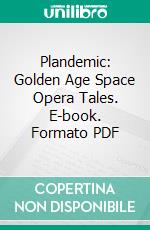Basil Wells: Golden Age Space Opera Tales. E-book. Formato PDF - 9788835886839
di S. H. Marpel
edito da MIDWEST JOURNAL PRESS , 2020
Formato: PDF - Protezione: nessuna
Basil Eugene Wells (June 11, 1912 – December 23, 2003) was an American writer. His first published story, "Rebirth of Man" appeared in the magazine Super Science Stories in 1940. He wrote science fiction, fantasy western and detective stories for various magazines sometimes under the name Gene Ellerman.
Space Opera is a subgenre of science fiction that emphasizes space warfare, melodramatic adventure, interplanetary battles, chivalric romance, and risk-taking. Set mainly or entirely in outer space, it usually involves conflict between opponents possessing advanced abilities, futuristic weapons, and other sophisticated technology.
The term has no relation to music, as in a traditional opera, but is instead a play on the terms "soap opera", a melodramatic television series, and "horse opera", which was coined during the 1930s to indicate a formulaic Western movie. Space operas emerged in the 1930s and continue to be produced in literature, film, comics, television, and video games.
The Golden Age of Pulp Magazine Fiction derives from pulp magazines (often referred to as "the pulps") as they were inexpensive fiction magazines that were published from 1896 to the late 1950s. The term pulp derives from the cheap wood pulp paper on which the magazines were printed. In contrast, magazines printed on higher-quality paper were called "glossies" or "slicks". (Wikipedia)
The pulps gave rise to the term pulp fiction. Pulps were the successors to the penny dreadfuls, dime novels, and short-fiction magazines of the 19th century. Although many writers wrote for pulps, the magazines were proving grounds for those authors like Robert Heinlein, Louis LaMour, "Max Brand", Ray Bradbury, Philip K. Dick, and many others. The best writers moved onto longer fiction required by paperback publishers. Many of these authors have never been out of print, even long after their passing.
Anthology containing:
Quest's End
Quest of Thig
Queen of the Blue World
Moment of Truth
Second Sight
Pioneers
Stalemate
Scroll Up and Get Your Copy Now.
Space Opera is a subgenre of science fiction that emphasizes space warfare, melodramatic adventure, interplanetary battles, chivalric romance, and risk-taking. Set mainly or entirely in outer space, it usually involves conflict between opponents possessing advanced abilities, futuristic weapons, and other sophisticated technology.
The term has no relation to music, as in a traditional opera, but is instead a play on the terms "soap opera", a melodramatic television series, and "horse opera", which was coined during the 1930s to indicate a formulaic Western movie. Space operas emerged in the 1930s and continue to be produced in literature, film, comics, television, and video games.
The Golden Age of Pulp Magazine Fiction derives from pulp magazines (often referred to as "the pulps") as they were inexpensive fiction magazines that were published from 1896 to the late 1950s. The term pulp derives from the cheap wood pulp paper on which the magazines were printed. In contrast, magazines printed on higher-quality paper were called "glossies" or "slicks". (Wikipedia)
The pulps gave rise to the term pulp fiction. Pulps were the successors to the penny dreadfuls, dime novels, and short-fiction magazines of the 19th century. Although many writers wrote for pulps, the magazines were proving grounds for those authors like Robert Heinlein, Louis LaMour, "Max Brand", Ray Bradbury, Philip K. Dick, and many others. The best writers moved onto longer fiction required by paperback publishers. Many of these authors have never been out of print, even long after their passing.
Anthology containing:
Quest's End
Quest of Thig
Queen of the Blue World
Moment of Truth
Second Sight
Pioneers
Stalemate
Scroll Up and Get Your Copy Now.
Ean
9788835886839
Titolo
Basil Wells: Golden Age Space Opera Tales. E-book. Formato PDF
Autore
Editore
Data Pubblicazione
2020
Formato
PDF
Protezione
nessuna
Punti Accumulabili








